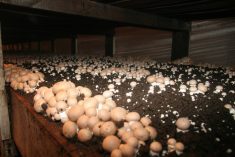Yet another report is warning about the severe labour shortages in agriculture and the related risks to the country’s ag industry.
On Nov. 8, the Canadian Federation of Independent Business released a report called, Help Wanted: Labour Shortages Threaten the Future of Canadian Agriculture.
The CFIB used existing data for its report but also surveyed its members in September to gather information on perceptions of the labour shortfall.
Read Also

Agri-business and farms front and centre for Alberta’s Open Farm Days
Open Farm Days continues to enjoy success in its 14th year running, as Alberta farms and agri-businesses were showcased to increase awareness on how food gets to the dinner plate.
“Through data and insights coming directly from members … we highlight the experiences of small- and medium-sized agri-businesses that have been affected by chronic labour shortages which are exacerbated by other major issues… (like) Canada’s aging population,” the report says.
“Coupled with rising carbon taxes and the growing burden of environmental regulations, farmers are facing significant costs and risks in 2022 as they cope with fewer workers.”
The CFIB survey of small to mid-sized agri-businesses found the following:
• Nearly two-thirds (63 percent) of agri-businesses could not get all the staff they needed.
• 95 percent of agri-business owners had resorted to working more hours and 43 percent didn’t find it a useful solution to their labour problems.
Those numbers are based on CFIB surveys done earlier in 2021 and earlier this year.
The CFIB member survey from September found similar results:
• 61 per cent of owners asked their employees to work more hours because of labour shortages.
• 48 percent of agri-businesses have had to turn down sales or contracts.
Also concerning is the lack of optimism in the agriculture industry, the CFIB said.
Compared to a number of industries – manufacturing, construction, hospitality and others – agri-business owners had the least confidence in the future of their enterprise, the CFIB report said.
“Four in five agri-businesses say they would not advise someone to start a business because of labour shortages. This is concerning, given the retiring population and lack of youth turning to agriculture for a career. We need to ensure agriculture is a viable career path for the next generation of farmers and agri-business professionals,” said Taylor Brown, senior policy analyst at CFIB.
Farmers and agri-business owners have tried to solve their labour shortfalls by offering higher wages, hiring temporary foreign workers, hiring retired workers and increasing the use of automation, the CFIB said. Those strategies have had limited success.
Geoff Propp, vice-president and general manager of Harvest Meats, a company that makes sausages, hot dogs, sliced meats and other products in Yorkton, Sask., said in September that Harvest Meats is short about 20 workers. The company is expanding to fill strong demand for their products, and Propp has considered automating some processes at the meat plant to reduce his labour needs.
But that hasn’t been easy. Companies with the know-how and technology to automate meat processing are overloaded with inquiries right now.
“I’ve been trying to talk to someone for two months … to get it going,” Propp said. “They’re inundated with guys like me, knocking on their door. Getting someone to just phone you back is almost impossible.”
Propp will likely opt for temporary foreign workers to fill some of the vacant and new positions at Harvest Meats. But farmers and ag businesses are already relying heavily on foreign workers and recent immigrants to Canada.
“Nearly a quarter (23 percent) of agri-businesses reported that more than half of their workforce comprised new immigrant workers – more than any other sector,” the CFIB said in its report.
In comparison, the hospitality industry (food services, hotels) also depends on new immigrants but only 12 percent of hospitality businesses had a 50 percent or higher percentage of new immigrants on their staff.
Agriculture businesses use TFWs because new immigrants are reliable and have a strong work ethic, the CFIB report says. As well, they are willing to live in rural areas, unlike young Canadians who grew up in large cities.
However, the paperwork and process of recruiting TFWs from the Philippines, Central America and elsewhere is torturous. It can take six to nine months for federal government approval and business owners must bear the cost and time of the program.
The CFIB is urging the federal government to simplify and streamline the TFW process and to “create support programs for TFWs in rural communities such as language (training).”
CFIB has other recommendations to address the ag labour shortage, such as tax relief for the hiring of older workers and other under-represented groups and encouraging automation in agri-businesses through programs or tax credits
Contact robert.arnason@producer.com
















